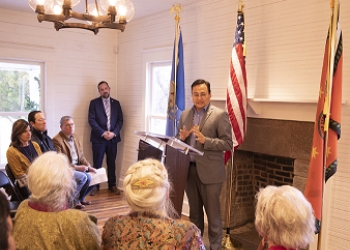News
Cherokee Nation
Posted: Nov 28, 2019 12:34 PMUpdated: Nov 29, 2019 6:23 AM
Chief Hoskin Proposes Cherokee Nation Historic Registry Act

Cherokee Nation Principal Chief Chuck Hoskin Jr. announced Tuesday the Cherokee Nation Historic Registry Act, proposed legislation that will provide a comprehensive framework for identifying, protecting and preserving properties of historical significance to the tribe. ChiefHoskin unveiled the proposed legislation during a visit to historic Saline Courthouse in Delaware County.
The tribe has identified a preliminary list of nearly 80 locations within the Cherokee Nation, many of which are not listed on a national registry.
“The Cherokee Nation has been in Northeast Oklahoma since long before Oklahoma was even a state. There are signs of our culture and our history all throughout the 14 counties of the Cherokee Nation,” said Principal Chief Chuck Hoskin Jr. “Whether it is the refreshing waters of a spring that has supplied Cherokee families with life-sustaining water, a century-old building where our ancestors gathered together, or the solemn grounds of a cemetery where a Cherokee leader has been laid to rest, these places are rich in Cherokee history and must not be forgotten. The Cherokee Nation Historic Registry Act will ensure we can protect these sacred sites and pass them along to future generations of Cherokees.”
The Cherokee Nation Historic Registry Act is sponsored by Tribal Councilor Keith Austin, of Claremore, and calls for the tribe’s Natural Resources office to maintain a database of historical places for protection and preservation. The act also makes it a crime to deface tribal historic sites listed on the registry, and incorporates a permit system for excavation and manipulation of cultural resources on historic sites.
The act will go before the Council of the Cherokee Nation in December.
“I want to commend Chief Hoskin and the Cherokee Nation’s Natural Resources department for helping to keep our history alive through these preservation efforts,” said Councilor Austin. “Our historic locations tell the story of the Cherokee people and of our ability to overcome even the harshest of trials. The Cherokee people are resilient and through our preservation efforts, I believe we will never forget where we came from or how our ancestors laid the groundwork for us.”
In the past five years, Cherokee Nation and Cherokee Nation Businesses have invested approximately $14 million for the preservation of cemeteries and other historical projects, along with the Cherokee National History Museum, Cherokee Prison Museum, the Cherokee Nation Surpreme Court Museum, Sequoyah’s Cabin, Ross School and Saline Courthouse, which will open as a museum in the spring of 2020. On Tuesday, Chief Hoskin praised those efforts and committed to putting an additional emphasis on protecting historical sites.
Tuesday’s announcement is the latest of Chief Hoskin’s first 100 days initiatives. Since his inauguration in August, Chief Hoskin has worked with the Council of the Cherokee Nation to launch the $30 million Housing, Jobs and Sustainable Communities Act to repair hundreds of Cherokee homes and remodel community centers; create the Career Readiness Act, doubling the tribe’s investment for training Cherokees in health, IT, construction and line work; and make the tribe’s largest language investment ever through the Durbin Feeling Cherokee Language Preservation Act, which will provide $16 million to the tribe’s Cherokee language program.
With support of the Council of the Cherokee Nation, Chief Hoskin also increased the minimum wage at Cherokee Nation and Cherokee Nation Businesses to $11 an hour, announced his intent to send a Cherokee delegate to Congress, and created the cabinet-level position of Secretary of Veterans Affairs
« Back to News

